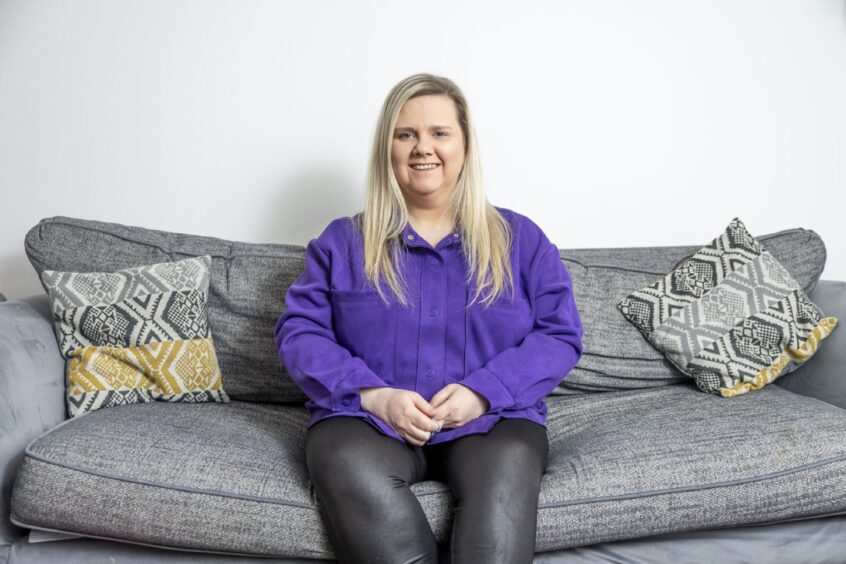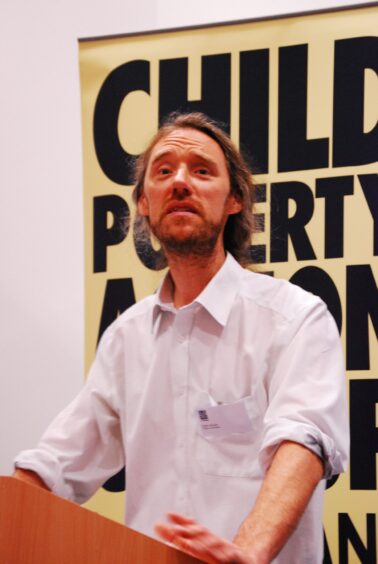
Scottish families urgently need more help with crippling childcare costs, campaigners warn today.
Equality and children’s welfare groups say provision in Scotland has fallen dramatically behind that available in England, leaving parents here struggling.
Parents are paying an average of £1,079.59 a month for childcare – and The Sunday Post has spoken to families with more than one child paying double that.
From next month, two-year-olds in England will be eligible for some free childcare, while Scottish families must wait another year.
In England, two-year-olds will qualify for 15 hours a week of funded childcare, with the entry age falling to nine months from September, and hours doubling to 30 a week from September 2025.
In contrast, in Scotland families have to wait until their children are three to access free childcare, when they are eligible for 30 hours a week.
Now the Scottish Women’s Budget Group – an umbrella group of organisations including children’s charities, parent campaign groups, early education and childcare groups – is speaking out on Mothers’ Day, and says further help is urgently needed.
Acting co-ordinator Carmen Martinez said: “I think something needs to be done, because the cost of a one or two-year-old is very expensive.
“I would argue that because of the cost-of-living crisis, further support is needed. I would say, they should be looking into childcare for one and two years old, but particularly things exasperate when you have twins – it’s extreme.
“I would say the breadwinner model is still in everyone’s mind. Even if men earn less, I don’t think they would be comfortable staying at home. Culturally, we are still far away from full equality.”
Free childcare
Scotland
All children aged three to four can get 1,140 hours of free early learning and childcare per year, funded by the Scottish Government and councils – the equivalent to 30 hours per week in term time. The offer has been in place since August 2021, and some two-year-olds also benefit. Depending on their circumstances or if their parents receive some form of support, they could get 16-30 hours.
England
From April 2024, Westminister will be rolling out funded childcare provision to all two-year-olds, where parents can apply for 15 hours of free childcare a week during term time, with a wider rollout providing 30 hours to all eligible children from nine months to five years by September 2025. To qualify, parents must individually earn more than £8,670 (from April 2023) but less than £100,000 per year.
Charity Pregnant Then Screwed, which campaigns for childcare reform, flexible working and more parental leave, has carried out research on the impact of childcare costs on families and particularly women and their careers.
It found 43% of Scottish parents felt they cannot afford to have any more children due to childcare costs, that 65% of parents have reduced their hours due to childcare costs, and that 10% have been forced out of work by them.
The charity’s Scotland lead, Carole Erskine, said: “We know that parents are desperate to see the funded hours in Scotland expanded. The first minister promised childcare expansion in last year’s Programme For Government but there’s no timescale for when this will happen. The pressure is on the Scottish Government to outline when parents will start to see this benefit.
“Parents in Scotland will be rightly looking to England and asking why the funded hours for two-year-olds isn’t being extended here.”
Statistics show women still remain the primary caregiver, often having to give up work or reduce their working hours, which impacts on women’s economic equality and professional development, contributing to gender inequality.
Cara Stevenson, who leads GMB Scotland’s women’s campaign unit, said the job opportunities of too many women are still dictated by childcare arrangements and not their skills and experience.
She said: “The lack of affordable childcare is an enduring scandal for parents and for every Scot because our country is losing the talents, skills and experience of so many women who could be delivering for their families and the economy.”
‘There is no support for parents’
In preparation for this article, The Sunday Post has spoken to numerous women who are struggling with childcare costs or who have had to change their working hours to keep these costs manageable.
One woman, a school teacher with an annual salary of £54,000 who wished to remain anonymous, has twin daughters. She said she was considering giving up her job because of the overwhelming costs of childcare – she was paying more than £2,000 a month.
The mum from East Lothian said: “There is no support for parents. It’s hard enough paying for childcare for one child, but having two…”
“The Scottish Government has no idea how big a problem it is. There is absolutely no help given to us.
“I have had friends who were pregnant with twins who are considering abortion due to how expensive childcare is going to be for them.”
Amy Scott, a teacher who has twins, said that the lack of support for working parents is awful and as a mum of twins it can be virtually impossible.
She had to use a childminder and even with the 20% tax-free childcare, it still costs her and her partner £35 a day.
She said: “’I’m lucky my mum was able to give up a day of work to support us and that we, as parents, have good jobs because my heart goes out to working parents who are less fortunate than us!
Em Rendos and her husband both work full-time and have no family support for childcare. They are paying £1,075 per month on childcare, and say they received a fee increase twice last year.
Rendos said: “We have really struggled to make ends meet, my work was refusing to allow me to work from home or offer alternative work schedules to suit some nursery attendance for her, so it was either one of us not work at all or she goes in completely full-time.
“I stayed at home for the first year but, with Covid and no family support, I really struggled and my mental health was impacted.”
The Scottish Government said that supporting families with affordable childcare was critical.
It said: “Supporting families through high-quality, affordable and accessible childcare is critical to our national mission to tackle child poverty.
“We will continue our work to develop an expanded national offer for more families with two-year-olds, and progress work with our six Early Adopter Communities to develop local systems of funded childcare for families who need it most.”
My career suffered as I looked after kids
Kerry Reich has two sons, one who will start school this year and a young baby. She says that if she did not have help from her mum and had to pay for childcare when her eldest was born, it would have been a worry.
Kerry said: “I don’t work full-time hours. For me, with Cohen and Corrie, I would have to pay for someone else to watch them, so I can drop the hours, take the financial hit, but spend the time with them.
“That’s why I requested to drop my hours, which has in a way held me back, because not a lot of jobs are advertised for part-time roles and it impacts where I can go, career-wise.
“When I fell pregnant with Corrie, that started the discussion again – am I going to go full-time and just to pay for childcare or am I going to stick it out till he starts school?
“It is a worry if we had to pay childcare fees. Each year the fees in nurseries are going up and it’s another outgoing. We’re in the situation where we have Cohen, who is about to go to school and then Corrie starts nursery so it’s almost like the fees will stay the same and we’ll pay for one child, if that wasn’t the case and we had two kids in nursery at the same time, that’s like paying another mortgage payment that’s huge. I don’t know if we would have been able to do that full time.
“Cohen goes to nursery two days a week, two of which are funded and then we pay for an extra half day for him.”
It’s extortionate. We were paying £650, double our mortgage
Kirsty Bagen, who lives in East Kilbride, said that since November 2020 she has spent over £10,000 on childcare for her five-year-old daughter.
She said: “My daughter will go to school this year. We currently get funded hours, but have to pay wrap around fees. “I work 37-and-a-half hours a week but my daughter only gets 22.8 hours a week funded as the 1,140 hours is spread over 52 weeks.
“As myself and my partner both work we are not entitled to any help. We get tax-free childcare vouchers but it’s still extortionate.
“When I went back to work full time we were paying £650 a month in childcare fees – at the time it was almost double our mortgage.
“Since November 2020 I have spent £10,179.50. I still have £2,569 to pay to the nursery. This total would have been more if I didn’t have tax-free childcare.
“When she starts school we will then have to pay for after-school care which will be £13-£15 an hour.”
Affordable childcare key to stop poverty
By John Dickie, director of Child Poverty Action Group Scotland
There is no question that Scotland must go further and faster in extending funded childcare to one and two-year-olds. It is vital to helping mums get into, and stay in, paid work. Lack of flexible, affordable childcare is a massive barrier preventing families from increasing their incomes and protecting their children from poverty.
The eligibility criteria for the extended childcare being introduced in England excludes low-income parents in jobs with low or variable hours and those preparing for their return to work, blocking children in the worst-off families from accessing places.
The more generous and fairer universal approach taken for three and four-year-olds in Scotland ensures all children can benefit, especially those in the lowest income families.
The Scottish Government must now build on this and expand its universal offer to one and two-year-olds as a matter of urgency.”
In his Programme for Government, the first minister committed to pilot six early adopter council areas to increase access to childcare from nine months through to the end of primary school; to accelerate the expansion of childcare for families with two-year-olds, and to introduce a new digital service for parents and carers to manage childcare.
I would comment further that one of the big disappointments of the Budget passed this week is that it is not at all clear what resources, if any, are being allocated to expand early years and childcare provision in line with the first minister’s Programme for Government commitments and his government’s own child poverty delivery plan.

Enjoy the convenience of having The Sunday Post delivered as a digital ePaper straight to your smartphone, tablet or computer.
Subscribe for only £5.49 a month and enjoy all the benefits of the printed paper as a digital replica.
Subscribe © Andrew Cawley
© Andrew Cawley © Jamie Williamson
© Jamie Williamson © Supplied
© Supplied